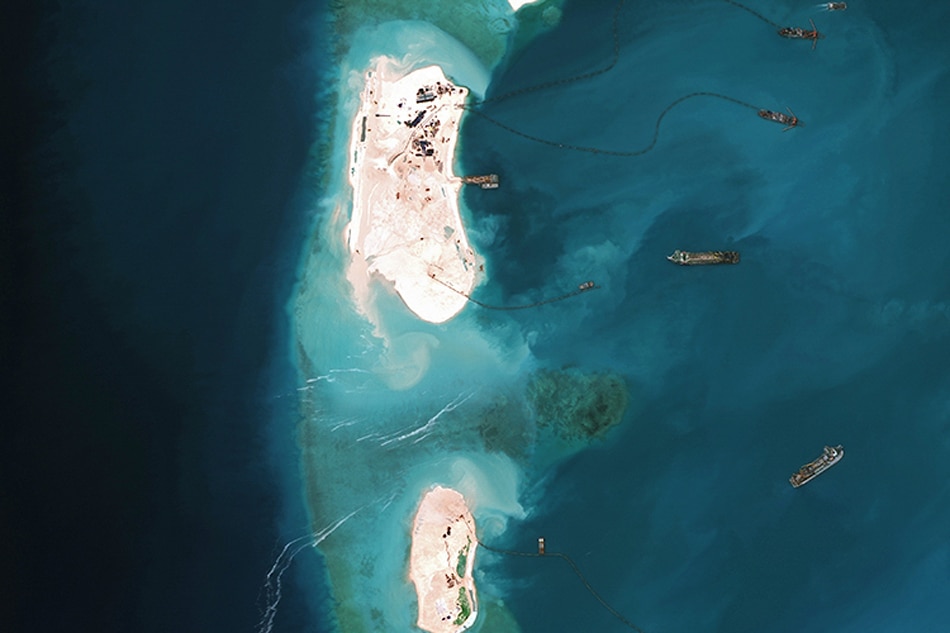Silence on sea row may cost PH bargaining power with China: ex-DFA chief | ABS-CBN
ADVERTISEMENT

Welcome, Kapamilya! We use cookies to improve your browsing experience. Continuing to use this site means you agree to our use of cookies. Tell me more!
Silence on sea row may cost PH bargaining power with China: ex-DFA chief
Silence on sea row may cost PH bargaining power with China: ex-DFA chief
ABS-CBN News
Published Apr 30, 2017 01:32 PM PHT
MANILA- The Philippines may have lost bargaining power with China after the Association of Southeast Asian Nations (ASEAN) skipped mention of China's arbitration loss and the maritime dispute in the South China Sea, former Foreign Affairs chief Albert del Rosario said Sunday.
MANILA- The Philippines may have lost bargaining power with China after the Association of Southeast Asian Nations (ASEAN) skipped mention of China's arbitration loss and the maritime dispute in the South China Sea, former Foreign Affairs chief Albert del Rosario said Sunday.
Del Rosario said Manila may have left itself with "little or no room" to negotiate its claims in the disputed waters in its efforts to gain Beijing's confidence.
Del Rosario said Manila may have left itself with "little or no room" to negotiate its claims in the disputed waters in its efforts to gain Beijing's confidence.
"Our government, in it's desire to fully and quickly accommodate our aggressive northern neighbor, may have left itself negotiating a perilous road with little or no room to rely on brake power and a chance to shift gears if necessary," Del Rosario told ABS-CBN News.
"Our government, in it's desire to fully and quickly accommodate our aggressive northern neighbor, may have left itself negotiating a perilous road with little or no room to rely on brake power and a chance to shift gears if necessary," Del Rosario told ABS-CBN News.
The joint statement of ASEAN leaders, which was issued early Sunday, was silent on China's defeat before the Hague-based arbitration court, which invalidated the basis of Beijing's sweeping claims over the South China Sea.
The joint statement of ASEAN leaders, which was issued early Sunday, was silent on China's defeat before the Hague-based arbitration court, which invalidated the basis of Beijing's sweeping claims over the South China Sea.
ADVERTISEMENT
It also avoided any mention of Beijing's island-building activities in the disputed waters, or of Chinese militarization of these islands.
It also avoided any mention of Beijing's island-building activities in the disputed waters, or of Chinese militarization of these islands.
Professor Jay Batongcal, director of the University of the Philippines Institute for Maritime Affairs and Law of the Sea, also expressed disappointment over the failure of the ASEAN Chairman's statement to mention the arbitral ruling.
Professor Jay Batongcal, director of the University of the Philippines Institute for Maritime Affairs and Law of the Sea, also expressed disappointment over the failure of the ASEAN Chairman's statement to mention the arbitral ruling.
Batongbacal said the Philippines was expected to initiate discussions on the sea disputes as the summit chairman.
Batongbacal said the Philippines was expected to initiate discussions on the sea disputes as the summit chairman.
Several ASEAN leaders had reportedly called for the joint statement to mention the need to avoid "land reclamation and militarization that may further complicate the situation."
Several ASEAN leaders had reportedly called for the joint statement to mention the need to avoid "land reclamation and militarization that may further complicate the situation."
ASEAN member-states Brunei, Malaysia, the Philippines and Vietnam have claims that overlap those of China in the South China Sea.
ASEAN member-states Brunei, Malaysia, the Philippines and Vietnam have claims that overlap those of China in the South China Sea.
With Manila's hosting of ASEAN this year, President Rodrigo Duterte has been repeatedly urged to raise the maritime dispute to his fellow leaders but the Philippine president insisted that the arbitral ruling was a "non-issue."
With Manila's hosting of ASEAN this year, President Rodrigo Duterte has been repeatedly urged to raise the maritime dispute to his fellow leaders but the Philippine president insisted that the arbitral ruling was a "non-issue."
Since assuming the presidency, Duterte has realigned Manila's foreign policy closer towards China and veered away from its usual ally the United States.
Since assuming the presidency, Duterte has realigned Manila's foreign policy closer towards China and veered away from its usual ally the United States.
--with a report from Tarra Quismundo, ABS-CBN News
ADVERTISEMENT
ADVERTISEMENT



